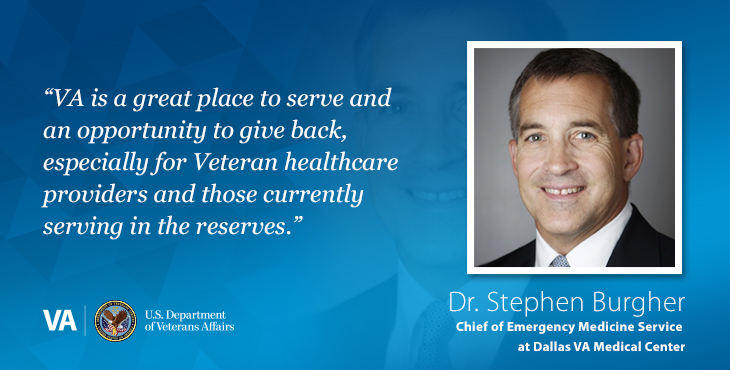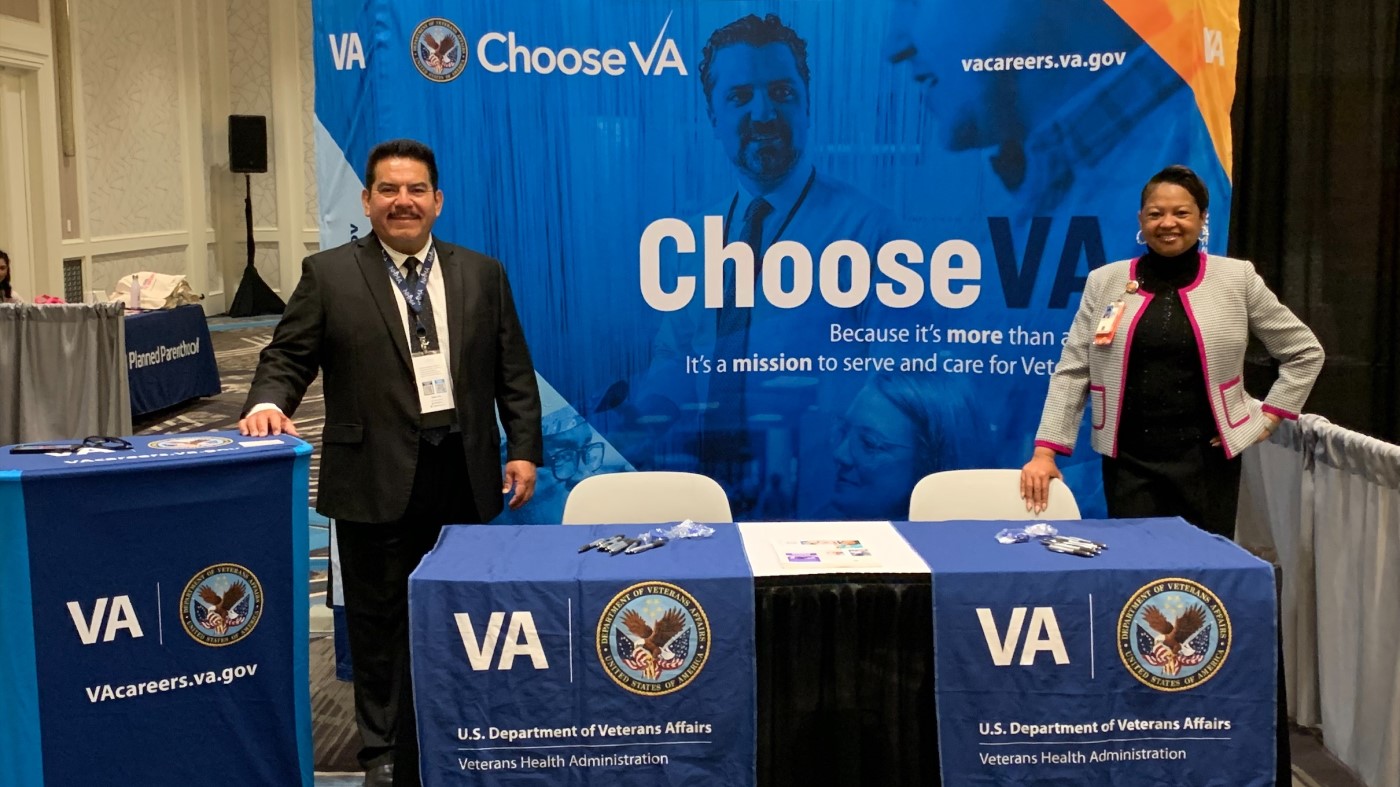As Chief of Emergency Medicine Services at Dallas VA Medical Center, Dr. Stephen Burgher not only leads emergency care for the over 113,000 Veterans that are part of the VA North Texas Health Care System, he continues his service to the United States as a Navy Reserve Captain.
A former Navy Flight Surgeon, Dr. Burgher brings unique insight and understanding to his current work with those who have served. He’s utilized the career and leadership development tools VA offers to grow within his role and help his team continually improve the level of acute care services offered to Veterans in need.
In this installment of our #ChooseVALeadership Careers blog series, Dr. Burgher shares how working at VA has helped him grow as a healthcare leader and why other emergency medicine physician trainees should consider a career caring for Veterans.
What was appealing about a career at VA?
As a Veteran, it was a natural transition to serve those who have served. Plus, there are challenges and opportunities for improvement at VA that I believe Emergency Medicine is uniquely capable to meet and overcome if properly applied.
How has VA helped you grow in your career?
VA North Texas Health Care System has been very supportive of leadership development and empowering leadership. We have implemented various initiatives, many of which require inter-service collaboration, with the support of executive leadership.
VA has offered many opportunities for my team to grow, and has provided exceptional training, whether it’s clinical–such as point of care ultrasound training (POCUS), Sim training, and out of operating room airway management (OORAM)–or developing leadership through new supervisor training. National VA Emergency Medicine has been very supportive and inclusive of the Dallas VA Emergency Department leadership.
Can you cite a few key benefits of working at VA?
With over 12 years in active duty, federal employment provides a way to buy back time toward retirement rather than it be wasted, which is a huge benefit. In addition, as a reservist, I have military leave and a financial pay differential if I am mobilized. Other benefits include healthcare and three-pronged retirement: Thrift Savings Plan (TSP), Federal Employee Retirement System (FERS) and Social Security.
What do you find most surprising about working at VA?
The access and good care provided at VA.
Without revealing patient information, can you let us know about a recent emergency you helped resolve?
I have a Veteran friend who hadn’t previously navigated VA, but was eligible as an Operation Iraqi Freedom/Operation Enduring Freedom Veteran. He called me because he was concerned about sudden hearing loss in his left ear. After a few questions, I told him this was an ear, nose and throat emergency and to come to VA immediately. I was able to get him seen and referred to audiology and ENT that day. They started steroids and his hearing has improved from 0% to approximately 60-70% now, and he is being evaluated for a hearing aid. Remarkably, as part of the evaluation, he had an MRI and it revealed an acoustic neuroma (benign tumor) in his good ear! Glad to be able to help him out.
What story do you most often tell people about your work at VA?
I like the one about the Veteran I treated who was 98 years old. He told me he joined the Army in 1938 before WWII, and reenlisted after three years and then we went to war! He was sent to North Africa and shot in Tunisia. They wanted to redeploy him back to the United States, but he insisted on getting back to his unit. His unit, about to redeploy back to the States anyway, ended up getting diverted to Italy to support Patton’s move up through Italy. He then was sent to the UK, to prepare for the Normandy invasion. He was on the first wave of the landing and lost over 4,000 men from his brigade. He survived and pushed on up through France, only to wake up four days later in Belgium. He was told he was blown up and they needed to remove his legs. He refused, eventually recovered and still has his legs today–great American!
What would you tell other emergency medicine healthcare professionals who are interested in choosing a career at VA?
VA is a great place to serve and an opportunity to give back, especially for Veteran healthcare providers and those currently serving in the reserves.
This is a great time to become part of VA Emergency Medicine Team. We are seeing tremendous growth and opportunities.
Choose VA today
Use your emergency medicine skills to care for Veterans: Choose a VA career as a physician today.
- EXPLORE a VA career as a physician.
- APPLY for an open position in emergency medicine near you.
- LEARN how to #ChooseVA at VAcareers.va.gov.
- VIEW other posts in our #ChooseVALeadership Careers blog series.
Topics in this story
More Stories
May promises an informative month, with numerous events in some of the country’s most exciting cities offering opportunities to learn about VA.
Enjoy your own gold rush when you choose a rural VA community that offers great pay and remarkable benefits with a job at Fort Harrison, Montana.
Bring your administrative expertise to VA and earn great benefits while supporting our Veterans.







It is wonderful to know that there are people who care about our military working outside our borders, as well as veterans who have already served the armed forces of our country. We all have children and we would like them to continue with the path already opened by our parents or grandparents. And more if they are in need of medical attention, such as the disabled, who, having worked in a conflict zone, have been left with some type of disability. Thanks for sharing such valuable information, greetings
VA North Texas: please recruit / bring onboard more Primary Care Physicians who are fluent in English. I am a Veteran as are many with Hearing Impairment. Combine my hearing loss with someone who does not speak English well to begin with, in a foreign accent/dialect and who seemingly to a person speaks at their Computer, without looking at me until the appointment has concluded. I’m constantly asking what was said. What instructions I’m being given, what has been found at the minimal exam I am given and what tests results, tests that need to be done, medication changes, and on and on. I usually leave with a next to nothing exam and in the dark as to what he finds, etc. I’ve asked to change Physicians twice already. I know VA frowns on changing Physicians. It’s frustrating beyond words! This seems to be rampant throughout the VA but have noticed to be the case at North Texas VA System.
I believe I have some definite insight into this as I am a retired VA Physician Assistant who worked in the Nephrology Service of VAMC OKC for many years. I know what a Clinic appointment examination consists of and how my patients expected to be and were treated. They also expected the ‘Doc’ to look them in the eye when he spoke to them and to ensure they understood what was said during their appointment.
My apologies if I step on toes / feet by writing this but what I have written is true and is a real problem for many Veterans, everywhere that rely on VA for their Health / Medical and Psychological Care.
Do a survey, particularly of the North Texas System. Ask the Veterans about what I have said.
To who reads this can you please email your Senators or Representative contract the Veteran Affairs Committee passed a new Benefit Law for Disabled Veterans who is Disabled Veterans is 100 percent service connected definitely need to have a G4 implants for free because their is no absolutely not one works for a Veteran Medical Centers and don’t have a contract with the Veteran Affairs Administration but unfortunately they have Private Clinics know how but the majority of the Disabled Veterans is 100 percent service connected can’t afford to pay for the G4 implants and if a Disabled Veterans is 100 percent service connected don’t get the G4 implants it definitely will cause bad Health Care also it will cause bad gum disease and possible cause Cancer.